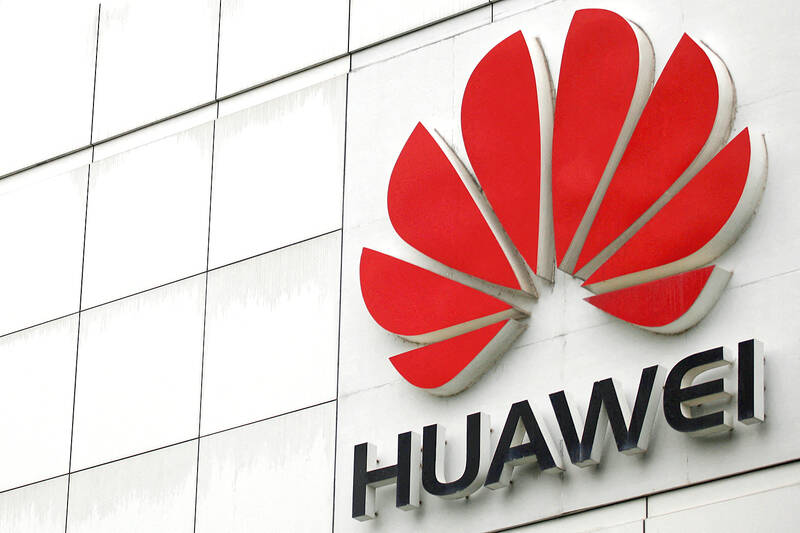Germany on Thursday said that it would phase out the use of components from Chinese telecom giants Huawei Technologies Co (華為) and ZTE Corp (中興) in its 5G networks in the coming years due to national security concerns.
It was the latest move by Berlin to reduce economic reliance on Beijing that some experts fear has left it vulnerable, and follows warnings from the EU that the firms pose a risk to the bloc.
Parts from Huawei and ZTE would no longer be used in “core” 5G mobile networks by the end of 2026 at the latest, the German Federal Ministry of the Interior said.

Photo: Reuters
In 5G access and transmission infrastructure, the systems of the telecom firms must be replaced by the end of 2029.
“We are protecting the central nervous systems of Germany as a business location — and we are protecting the communication of citizens, companies and the state,” German Minister of the Interior Nancy Faeser said.
“We must reduce security risks and, unlike in the past, avoid one-sided dependencies,” she said.
The ministry said that 5G networks form part of Germany’s “critical infrastructure” and are important for the functioning of sectors ranging from health to transport and energy.
Telecoms networks must be protected from cyberattacks, which could be an “existential threat,” it added.
Officials have reached agreements with Germany’s 5G network operators, Deutsche Telekom, Vodafone and Telefonica, on banning Huawei and ZTE.
Government sources had already indicated in September last year that Berlin was considering such a move, although the dates announced are later than those originally envisaged to give companies time to adopt the new measures.
Faeser would not be drawn on whether she feared retaliatory measures from China, although she said that Beijing had been informed about the bans.
“For me, as interior minister, it is a matter of finding regulations for telecommunications networks, for critical infrastructure, and I have done that,” she told a news conference.
In response to the ban, Huawei said there was “no specific evidence” that the firm’s “technology has cybersecurity risks.”
“Huawei has developed into a continuously innovative, secure, and reliable telecom equipment supplier in the German market,” a spokesperson said.
Beijing’s embassy in Berlin also said the move was driven by “groundless accusations.”
“There is no evidence indicating that these Chinese companies are a danger to any country,” the embassy said, according to state news agency Xinhua.
“Whether Germany can handle this issue fairly and justly will be a touchstone for its own business environment,” it added.
Factors that authorities looked at when deciding on the ban included whether the manufacturer was directly or indirectly controlled by the Chinese government, or whether they had been involved in activities that had a detrimental impact on Germany or other EU states.
The European Commission, the EU’s executive arm, last year described Huawei and ZTE as a risk to the bloc and called on EU member states to exclude the companies’ equipment from their mobile networks.

The Central Election Commission has amended election and recall regulations to require elected office candidates to provide proof that they have no Chinese citizenship, a Cabinet report said. The commission on Oct. 29 last year revised the Measures for the Permission of Family-based Residence, Long-term Residence and Settlement of People from the Mainland Area in the Taiwan Area (大陸地區人民在台灣地區依親居留長期居留或定居許可辦法), the Executive Yuan said in a report it submitted to the legislature for review. The revision requires Chinese citizens applying for permanent residency to submit notarial documents showing that they have lost their Chinese household record and have renounced — or have never

A magnitude 5.6 earthquake struck off the coast of Yilan County at 12:37pm today, with clear shaking felt across much of northern Taiwan. There were no immediate reports of damage. The epicenter of the quake was 16.9km east-southeast of Yilan County Hall offshore at a depth of 66.8km, Central Weather Administration (CWA) data showed. The maximum intensity registered at a 4 in Yilan County’s Nanao Township (南澳) on Taiwan’s seven-tier scale. Other parts of Yilan, as well as certain areas of Hualien County, Taipei, New Taipei City, Taoyuan, Hsinchu County, Taichung and Miaoli County, recorded intensities of 3. Residents of Yilan County and Taipei received

Taiwan has secured another breakthrough in fruit exports, with jujubes, dragon fruit and lychees approved for shipment to the EU, the Ministry of Agriculture said yesterday. The Animal and Plant Health Inspection Agency on Thursday received formal notification of the approval from the EU, the ministry said, adding that the decision was expected to expand Taiwanese fruit producers’ access to high-end European markets. Taiwan exported 126 tonnes of lychees last year, valued at US$1.48 million, with Japan accounting for 102 tonnes. Other export destinations included New Zealand, Hong Kong, the US and Australia, ministry data showed. Jujube exports totaled 103 tonnes, valued at

BIG SPENDERS: Foreign investors bought the most Taiwan equities since 2005, signaling confidence that an AI boom would continue to benefit chipmakers Taiwan Semiconductor Manufacturing Co’s (TSMC, 台積電) market capitalization swelled to US$2 trillion for the first time following a 4.25 percent rally in its American depositary receipts (ADR) overnight, putting the world’s biggest contract chipmaker sixth on the list of the world’s biggest companies by market capitalization, just behind Amazon.com Inc. The site CompaniesMarketcap.com ranked TSMC ahead of Saudi Aramco and Meta Platforms Inc. The Taiwanese company’s ADRs on Tuesday surged to US$385.75 on the New York Stock Exchange, as strong demand for artificial intelligence (AI) applications led to chip supply constraints and boost revenue growth to record-breaking levels. Each TSMC ADR represents